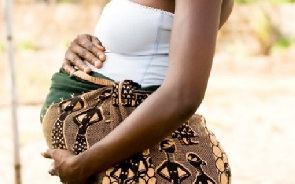 The training was to disseminate the guidelines for the prevention of pregnancy among school
The training was to disseminate the guidelines for the prevention of pregnancy among school
Participants at a Regional-Level training on the 'Back to School Advocacy Campaign' has called for an institutionalized school support system for girls who are pregnant or breastfeeding babies, yet were continuing their education to ensure a conducive environment and conditions to retain them in the schools.
According to the participants, feeding and nutritional needs of pregnant girls and breastfeeding mothers, as well as medical care, were different from that of girls who were not pregnant therefore there must be a systematic arrangement to cater for them.
The participants made up of stakeholders from the Ghana Education Service (GES), Media, Human Rights Institutions, Civil Society Groups and traditional leaders among others, were of the view that, apart from parental support, the school must also have the necessary facilities and logistics to support them to stay and complete the full cycle of education.
The back to school advocacy campaign is a GES intervention being implemented by the Girls Education Unit (GEU), to ensure the return of all pre-tertiary children, particularly girls whether pregnant or breastfeeding babies to the classroom when schools resume to full session, next year January, in line with government policy that sought to ensure that girls who were pregnant had the opportunity to continue their schooling after childbirth.
Reports from monitoring activities of the GEU of the GES and other credible data sources indicates that over 7,293 girls in upper primary, Junior High and Senior High school levels across the 16 regions of Ghana got pregnant in the 2018/2019 academic year, hence the back to school advocacy campaign to facilitate their re-entry to school.
The training was, therefore, to disseminate the guidelines for the prevention of pregnancy among school girls and facilitation of re-entry into school after childbirth to equip the stakeholders to become Regional Advocacy Task Forces who would in turn train teams at the district level to cascade sensitization in communities and see to it that all children, especially girls, returned to school safely when school fully resumed.
Mrs Monica Ankrah, Eastern Regional Director of Education, said covid-19 by its magnitude promises more drop outs if no interventions were made to bring children back to school due to the long break from school sessions and appealed to the stakeholders to be committed to the task.
She noted that parents and guardians support was very critical in the campaign to bring girls back to school after childbirth and charged teachers to be professional in discharging their duties to avoid stigmatization and low self-esteem of such girls.
Madam Judith Sakara, an Education Consultant, said apart from the covid-19 pandemic which was a challenge to children coming to school, the long break resulting in the negative occurrences such as teenage pregnancies and the likes posed a huge threat of high rate of school dropout.
She said, in view of all those challenges, the GES as part of the back to school campaign had developed strategies to mitigate the impact, mentioning the use of traditional games, threatre/drama activities, storytelling and cultural dances as measures introduced in the curriculum to relief students and attract them back to the classrooms.
Madam Sakara, indicated that in addition, age-apropriate guidance and counselling services for all levels would be made available in schools to calm students' anxiety weather of the coronavirus or stigma due to childbirth to protect the physical and mental state of the schoolchildren.
She charged the school heads and leadership to give full attention to, particularly those who would returned pregnant or breastfeeding by being non-judgemental in their actions and utterances to encourage such students to complete their education.
Mrs Ellen Gyekye, Programs Officer, School Health Education Programme (SHEP), said the campaign would also focus on avoiding corporal and abusive punishments by teachers and finding innovative ways of disciplining in schools.